
by Gideon Marcus
At the World Science Fiction Convention in New York this year, Spock was the man of the hour. There were no fewer than seven Vulcan costumers at the Ball, and the premiere of the episode "Amok Time" was a much-attended event. Rumors abounded that there were more Vulcanian surprises in store this season. It was whispered that one of the upcoming episodes would feature Spock's parents! Thus, we have been greatly anticipating a second return to Vulcan for the last ten weeks.
Well, Spock's Mom and Pop have shown up, but not quite the way we expected.
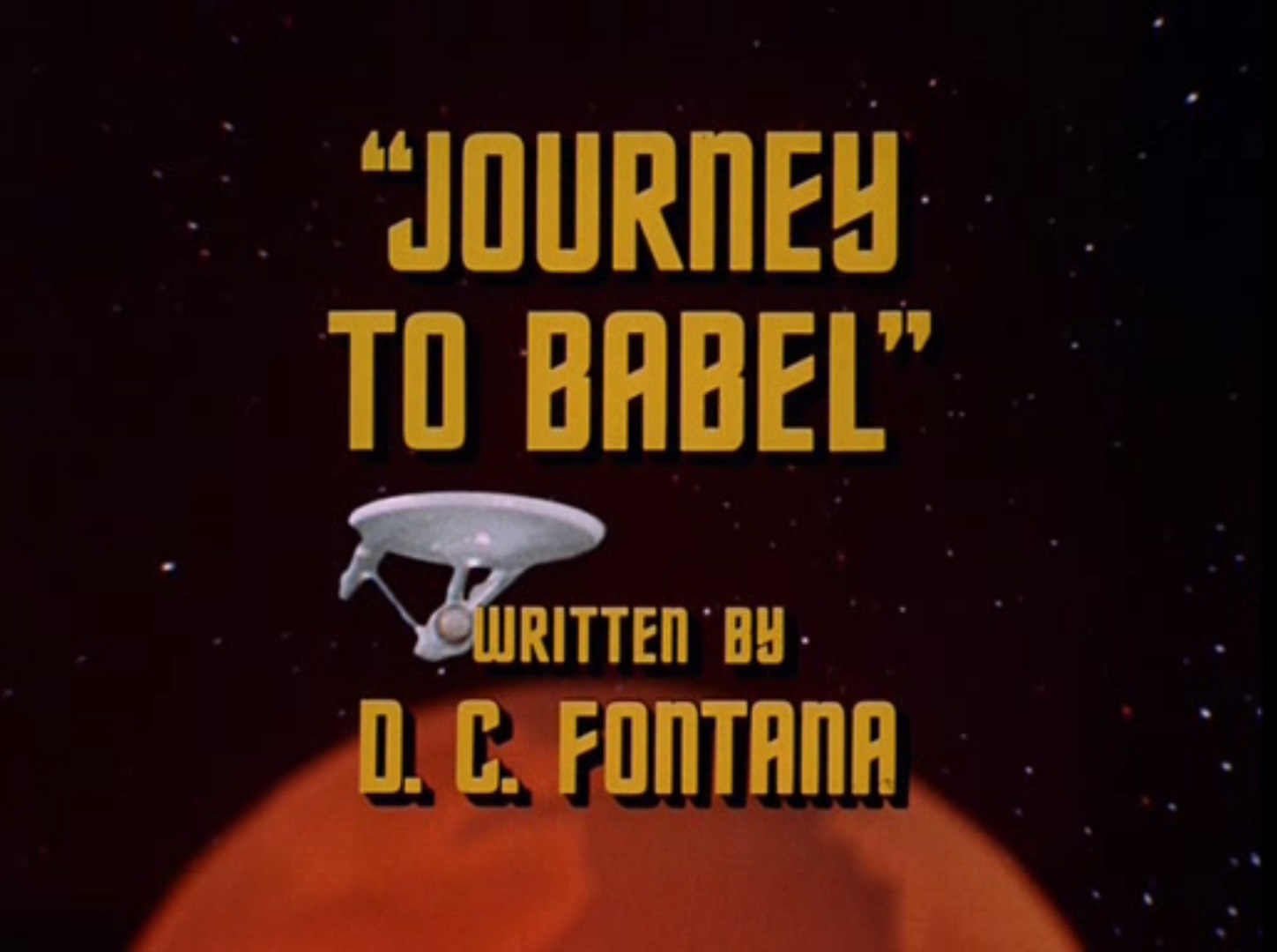
D.C. (Dorothy) Fontana has been attached to Star Trek for some time, and her pen has been felt on a number of scripts. "Journey to Babel", however, is the first one solely credited to her…and it does her credit!
In brief: The Enterprise is transporting one hundred delegates from dozens of Federation worlds to the planetoid Babel, where they will discuss and vote on the admission of Corridan. Corridan is a low-population, defenseless world that possesses tremendous reserves of dilithium crystals, making it an appealing target for raiders and wildcat mining operations. Membership in the Federation would offer a stepped up level of protection.
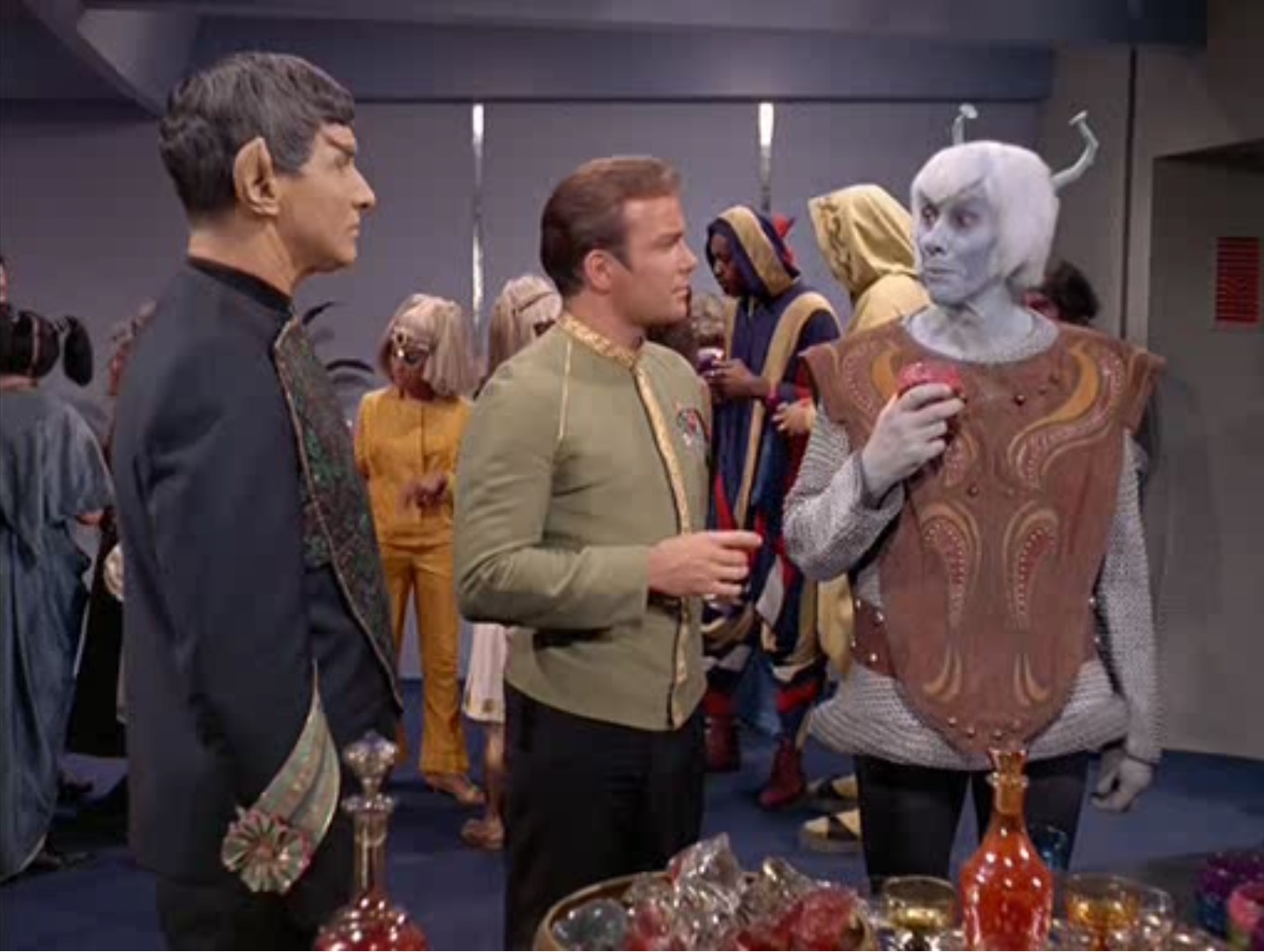
The Enterprise's rec room has become something of a babel, itself
The Vulcan delegation is led by Sarek, a 102-year old pulled out of retirement for this mission. Accompanying him are two anonymous aides and a handsome middle aged Earth woman, who is introduced as Sarek's wife, Amanda. Kirk had three guesses as to who the mixed couple might be, and he blew them all. Of course, they're actually Spock's parents (though the dashing Vulcan ambassador does not look anything like Balok, Spock's comment in "The Corbomite Maneuver" notwithstanding.)
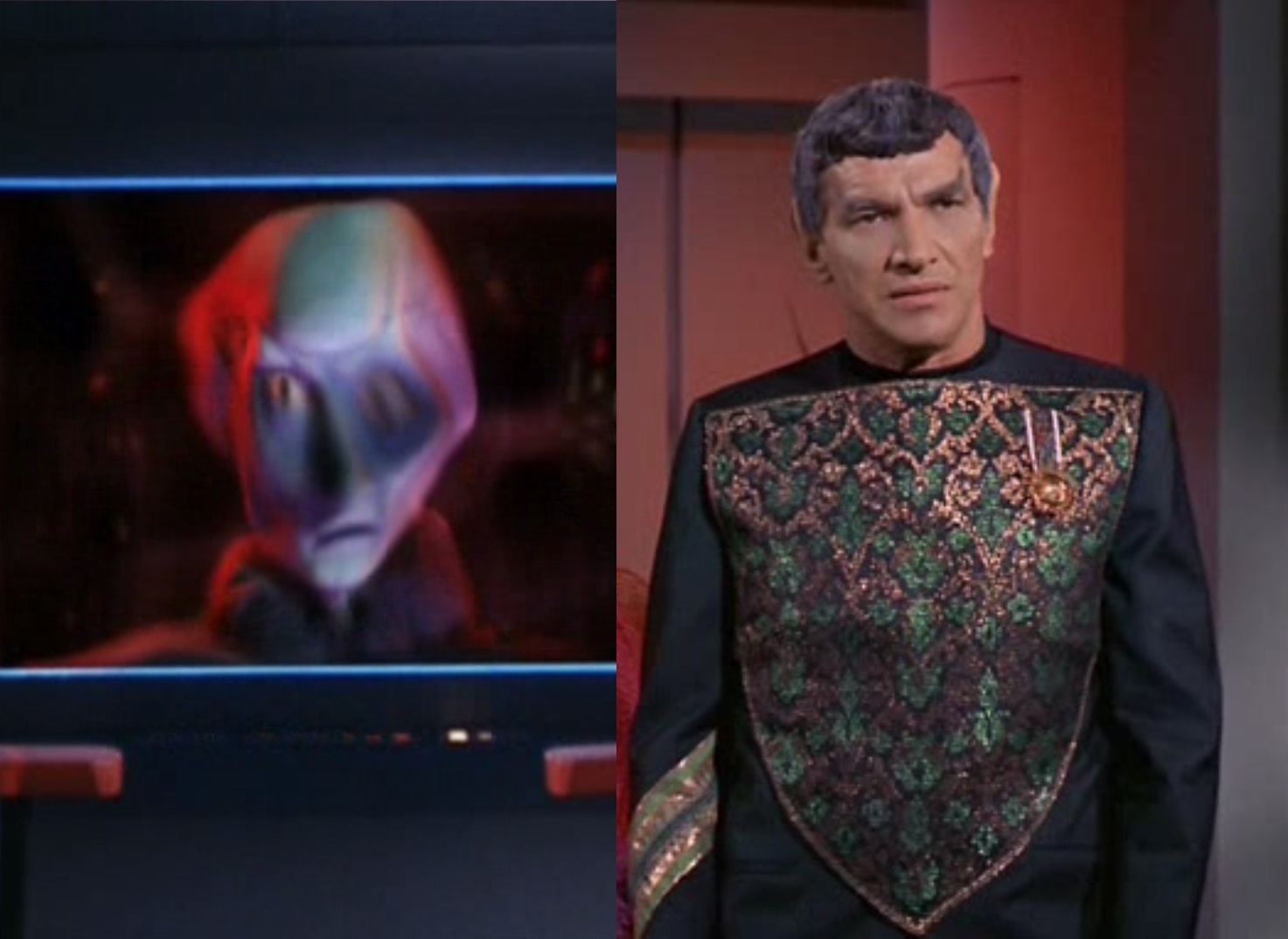
Maybe the resemblance is in personalities…
Sarek and Spock are estranged, for Spock chose a career in Starfleet over one in the Vulcan Science Academy. And, Vulcans being the super-logical creatures they are, they have mastered the art of snubbery and pouting.
However, events quickly overcome petty family squabbles. One of the delegates, the abrasive Tellarite named Gav, is murdered, and Sarek is the prime suspect. This slaying may have something to do with the mysterious super ship that is tailing the Enterprise, capable of an astonishing Warp 10. Finally, Sarek himself succumbs to a heart attack, and only surgery facilitated by a transfusion from his son's blood can save him. But Spock cannot leave his post, for Kirk has been stabbed by one of the Andorian delegation, and he can't take the center seat. Cue dramatic music.
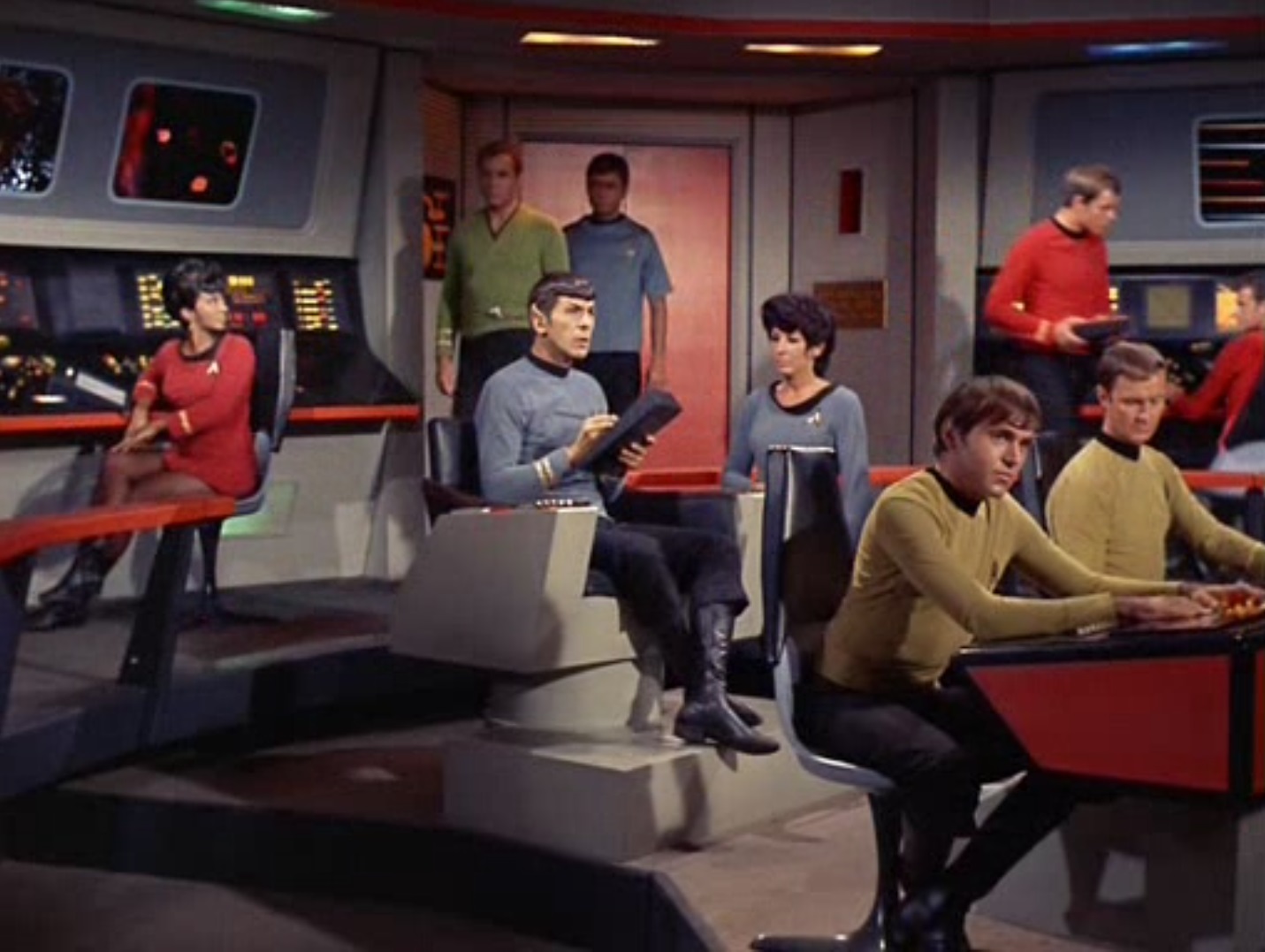
"Dear diary. I finally get to run the ship. I hope Jim takes a long time to recover so I don't have to save my mean ol' dad!"
There is a lot to like about this episode. Mark Lenard, whom we last saw as a Romulan commander in "Balance of Terror" (as well as two Mission: Impossible roles as a "Latin"), gives a fine turn as a reserved but not emotionless Vulcan. We get a little more breadth to Nimoy's performance with his more relaxed interactions with his mother. DeForest Kelley is a real stand-out this episode, even getting the last line of the show.
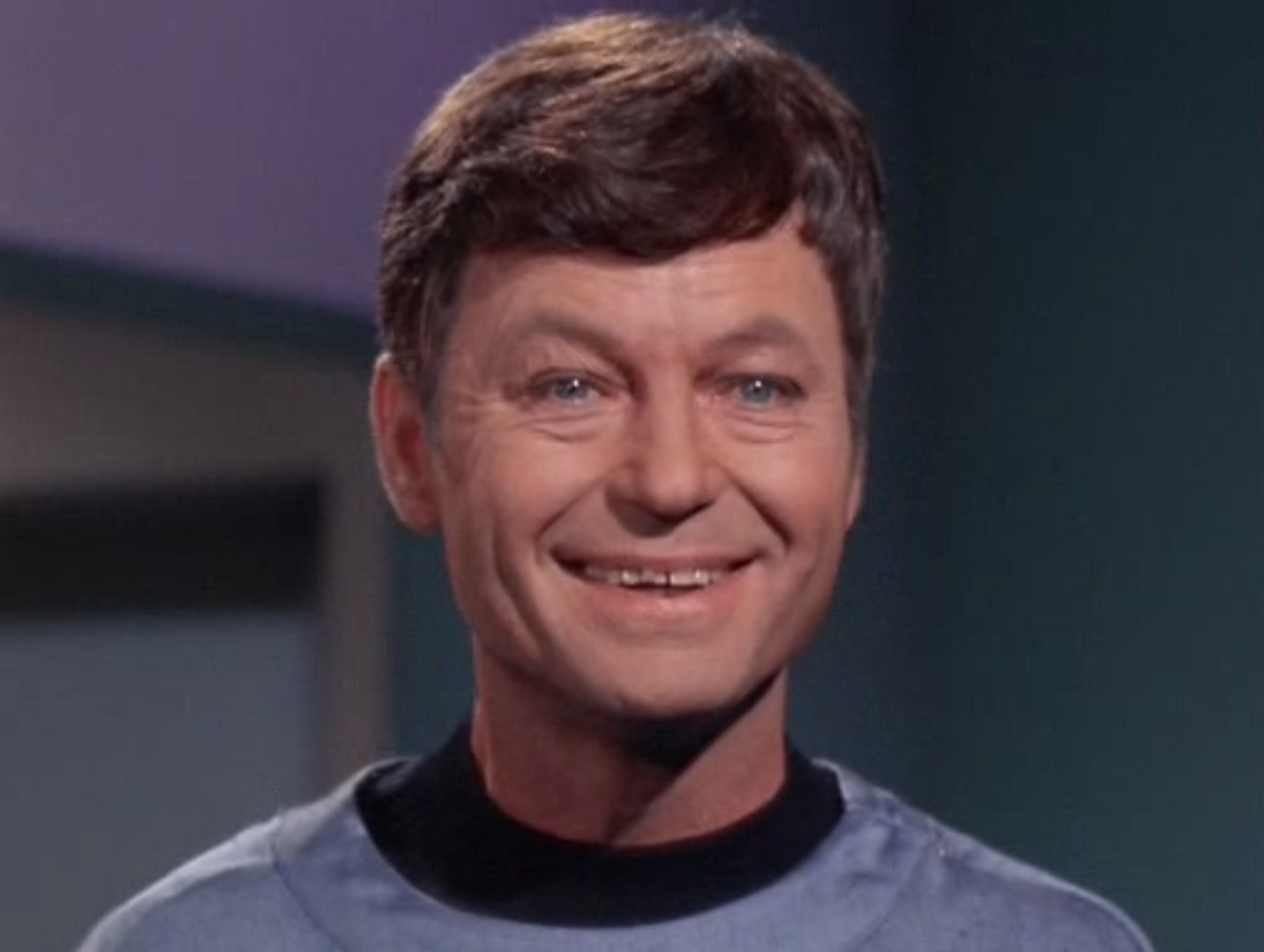
"I finally get the last word. Take that, Bill and Leonard, you primadonnas!"
The tense battle scenes on the bridge are excellent, and it was a delight seeing all the alien races. I was particularly impressed with the Andorian ambassador; the blue-skinned aliens appear to be a tonic to the Vulcans, prioritizing violence, passion, and pecunious aims. Chekov, Uhura, Chapel all get relatively meaty roles (though Sulu and Scotty are completely absent). And Shatner manages to turn in a more first-seasoned performance…minus the flying posterior attack he uses to dispatch his Andorian assailant.
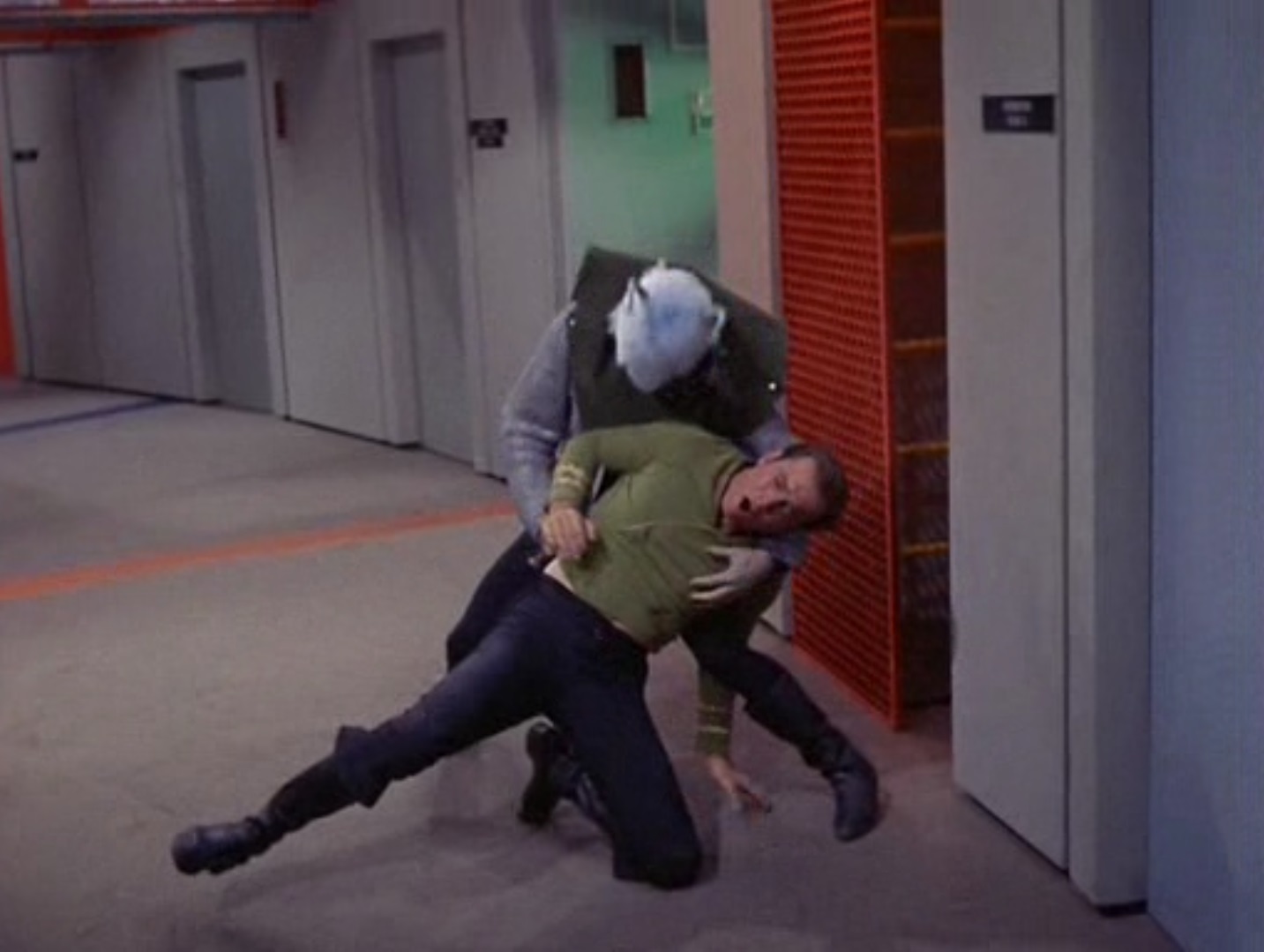
The captain suffers a grievous wound after using his "flying posterior attack" on his assailant
On the other hand, the episode has rough bits. The editing is particularly choppy, with the aforementioned Andorian/Kirk attack coming out of nowhere and some dialogue scenes being cut abruptly. The musical score is almost entirely from the library. This could be fine, except the musical pieces are all highly evocative of their origin. I kept expecting the attacking vessel to be a giant cornucopia, and when Sarek arrived, I expected they were about to enter a parallel dimension.
I've come to get a feel for my Star Trek directors. This season, Joseph Pevney and Marc Daniels have essentially alternated the past dozen episodes. I much prefer the avante garde latter to the staid former. Whenever Pevney is at the helm, I know I'm going to see a more stagey, less dynamic episode. It may be him to blame for Miss Jane Wyatt's particularly flat performance as Spock's mother.
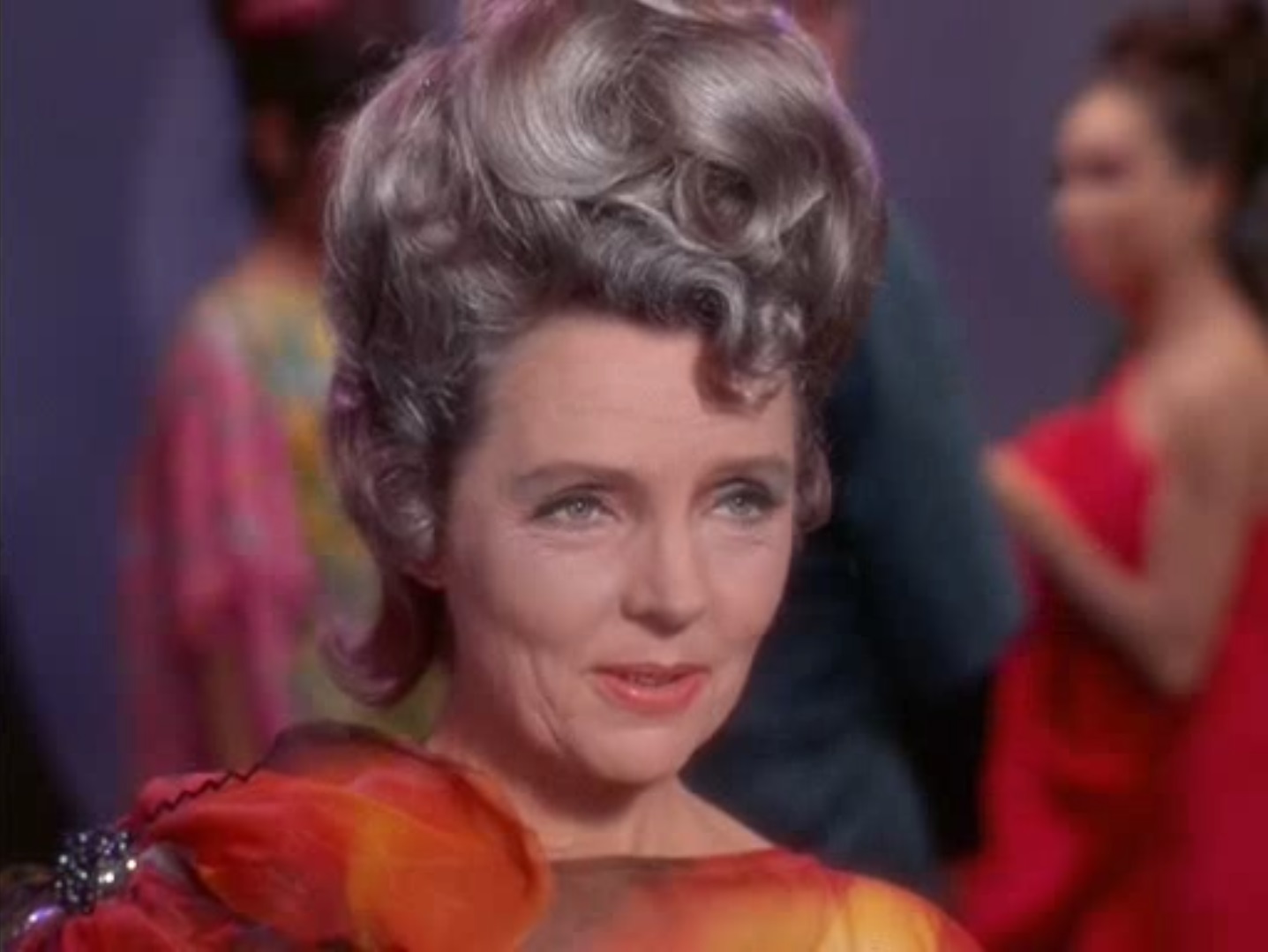
"I'm just here for the free drinks and blue fruit…"
Nevertheless, I have a largely favorable impression. Two concurrent plots were resolved nicely, many characters got to shine, and the scope of the Trek universe was expanded tremendously.
Four stars.

by Joe Reid
How Do You Say Love in Vulcan?
We have come to regard Vulcans as stoic and emotionless. Star Trek so far has provided two examples of what feelings of love, and emotions in general, exist in the complex Vulcan heart. The first was from season one’s “This Side of Paradise”, where we saw Spock expressing love and, dare I say, happiness as his emotional walls were toppled by a mind-altering spore. The second example being this season’s “Amok Time”, when Spock was driven mad by his Pon Farr. Showing intense emotional outburst, deceit, anger, and violence from Spock in his efforts to get to Vulcan to marry and mate driven by the intense hormonal assault. This week’s episode gave us our first untainted look at Vulcan emotions.
If we have learned anything from Star Trek it’s that Vulcan are quick to point out that emotional responses are a human failing. That Vulcans do not experience such things, because they are guided by logic. “Journey to Babel” painted a different picture, showing that Vulcans can hold long grudges, feel pride, display tenderness, love deeply, express frustration, and even engage in humor. They do indeed experience emotions, though usually filter responses to their feelings through a rubric of logic.
During introductions, Sarek completely ignored Spock. Kirk asked Spock to give them a tour, and Sarek’s response towards Spock bordered on contempt, asking Kirk for a different guide. It was later revealed by Amanda that Sarek disapproved of Spock’s choice to join Starfleet over the Vulcan Science Academy. Sarek not only scornfully held a long grudge when Spock didn’t meet his expectations, but rudely expressed that disappointment at the introductions. His behavior was clearly an emotional response.

"Son? I have no son."
Spock’s mother was a standout character this episode. She was unapologetically human, while showing full acceptance of her Vulcan husband and his role as a planet’s ambassador. Amanda was full of mirth, caring, prudence, tenderness, and above all loyalty, demonstrating an almost perfect example of the best of human qualities. Through his interactions with Amanda, we saw Sarek’s love. Humans show togetherness by holding hands. The Vulcan version is a gentle touch using only the index and middle fingers. A connection held up at the level of their hearts, not buried at the level of their loins, as is the case with humans. In almost every scene we were graced with this passionate and public, yet tender, expression of love and commitment from Sarek and Amanda.
Although guided by logic, Vulcans are easily as emotionally complex as humans. Though Sarek disagreed with Spock’s Starfleet decision, he said to his wife that Spock deserved to be shown the respect of a Starfleet officer and that she shouldn’t embarrass him, showing both Sarek’s pride in Spock and acknowledgement that Spock can feel embarrassment. Regardless of Sarek's brusqueness, Spock devotedly argued with Amanda and McCoy for the operation to save Sarek’s life. Even though Spock and Sarek shared few words during the episode, the final scene had them joking about why Sarek would marry such an emotional woman. An exchange followed by two fingers touching between Spock’s loving parents.
What stood out in this cloak and dagger episode filled with alien faces were the loving emotions of a Vulcan-Human family. A tender flower rooted amid a warzone, and I found it most acceptable.
Five stars
And introducing Mr. J. North, our new resident menace…
The Religious Subtext
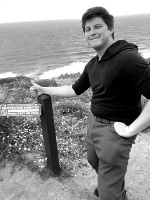
by J.M. North
My scope of the Star Trek universe has been so far limited, having started watching in the middle of season 2. This episode, regardless, seems like it would be exceptionally revealing even for those who are caught up in the series. What I have verified is that this is the first appearance of the Corridians, Andorians and the Orions, as well as of Spock’s mother and father and a number of other alien races. There is dialogue throughout indicative of The Federation and Star Fleet’s domain throughout the galaxy, and revealing of its ultimate alignment with the Vulcan ideals of scientific discovery, peace and fair interplanetary-cooperation. In the episode prior, Captain Kirk reveals in a discussion with Zefram Cochrane that mankind has settled up to 1,000 extraterrestrial bodies besides Earth, my own first indication to the extent of humanity's advancement as a species. This episode provides my first indication of the influence of the Federation and its true purpose as a diplomatic conference, as well as its relative advancement compared to other species–notably the Orions with whom Kirk is impressed for using the same phasers as Star Fleet.
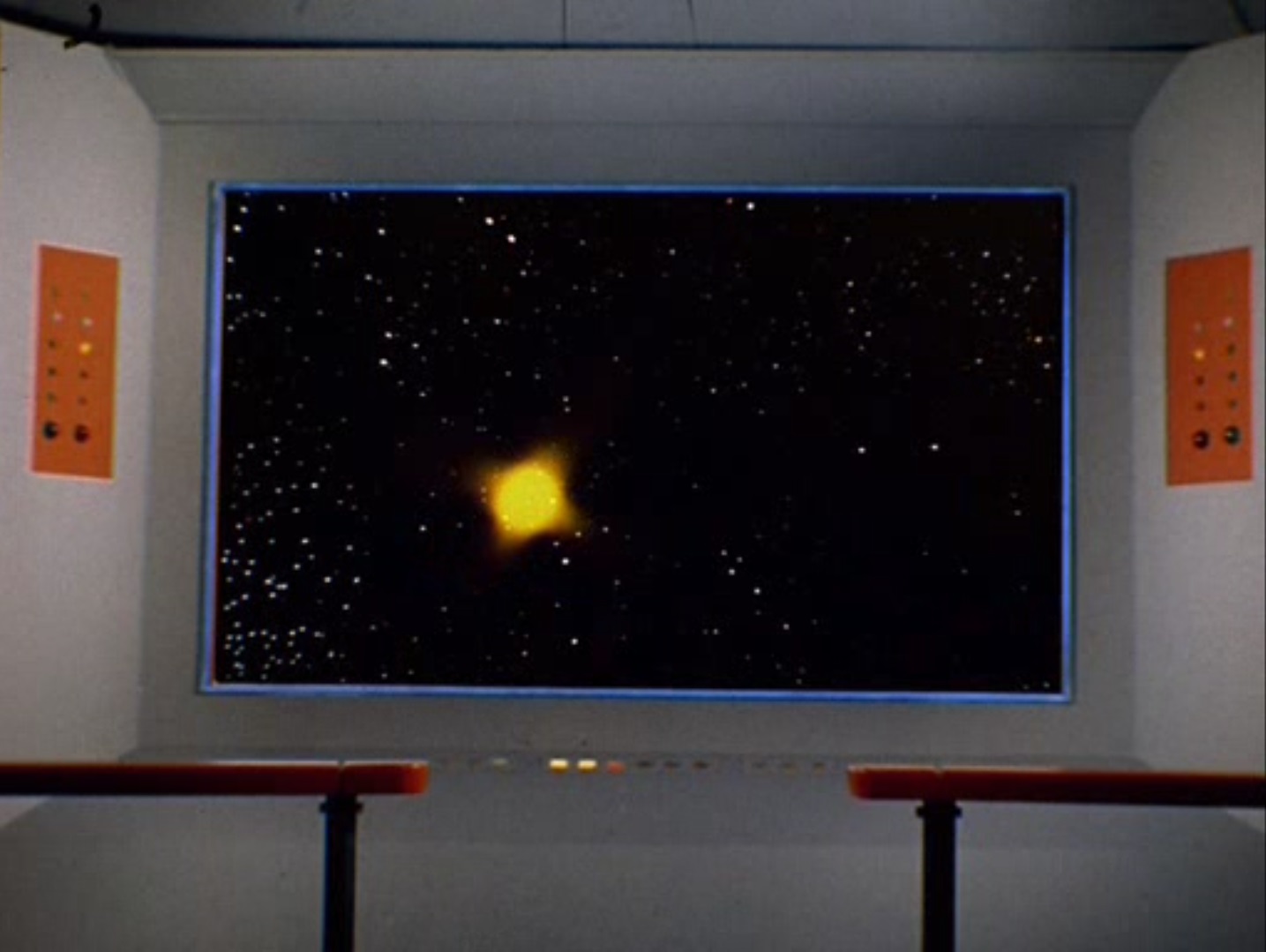
The Orion strikes!
In the episode prior there is a possible, easily dismissed reference to the bible when Zefram Cochrane considers planting a fig tree after his conflict with the Companion is resolved, symbolic perhaps of forgiveness, love or peace, or something abstract as the fig is mentioned in all sorts of contexts in the bible, which I would indeed dismiss if not for the much more evident reference to Christian canon in this episode. Journey to Babel, the title of which is unmistakably an allusion to the Tower of Babel story from Genesis, and the plot no doubt a representation of God’s subsequent punishment for man: the confounding of language and onset of war before the great flood. I find the thematic parallels to be quite compelling.
It is poetic how the sci-fi context is used to discuss biblical themes; well-written inter-stellar geopolitics provide the basis for a potential war between the adolescent Corridian race, the advanced planet-mining race of Tellarites and the provocative, warlike Orions, conveying the ultimate theme of division and conflict among races from the namesake parable. Rather than the confounding of language (thanks to universal translation), conflict arises by the confounding of ideas for how to treat the Corridians. The Tellarites are forward about their lack of support for Coridan’s admission to the Federation, and their desire to poach the planet clean, while the Orions seek to promote this conflict between them into an all out war that they could profit off of by selling to both sides.
Further compelling to me regarding this biblical theme is the discussion of the genesis of a new primitive race; the Corridians, and their comparison to other civilizations, and further their advancement by joining the Federation. Consider biblical canon; genesis of the human race in Eden, enslavement of the Israelites by the Egyptians (poaching of Corridan by the Tellarites?), following the advancement of society into the time of Rome. What I’d like to watch for now is if this religious subtext prevails throughout the show, or if it is just these two episodes that happen to have been inspired by biblical themes.
Five stars for good writing, a rich galaxy, and savvy biblical adaptation.

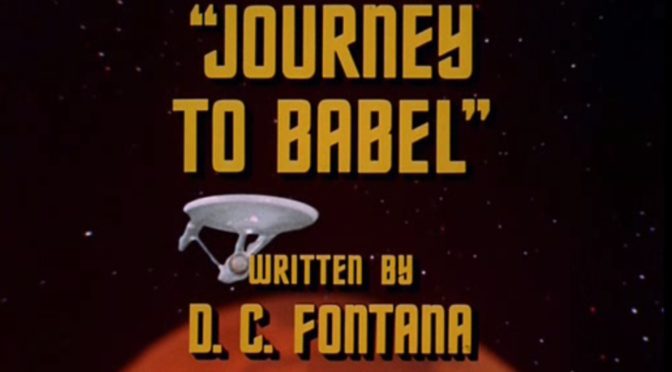

I thought this was a fantastic episode. The few minor flaws in the script are more than made up for by the outstanding performances by everyone. I would even go so far as to say that Jane Wyatt's performance isn't wooden, but rather that it reflects a woman who has spent decades living in a culture that frowns deeply on emotional expression.
I'm not as down on Pevney's direction as the Traveler. He's not as good as Marc Daniels by a long shot, but his work is consistently better than any of the other directors we've seen on the show. I did think there were a few too many extreme close-ups. With Spock and Sarek especially, you could sometimes clearly tell they were wearing heavy makeup.
In any case, an excellent hour of television. Of the ten episodes we've seen this season, four have been outstanding. That's an amazing track record. Of course, some of the lows have been very low, but even they've (mostly) been better than anything from Irwin Allen.
A terrific episode. Loved it.
What most strikes me about this fine episode is the fact that it's got so much going on, with multiple subplots. It's nice to get a glimpse of what the Federation is like, too.
Wig Trek rules, in this one. But definitely one of my favorite Star Trek teleplays — for both seasons.
The highlight for me is the dialogue between Spock and the Andorian, in a great performance by Reggie Nalder (from Hitchcock's The Man Who Knew Too Much). He's truly weird.
"He is Thelev, a member of my staff. I know nothing of him, only that he has served adequately. "
Spock: "there is no logic to Gav's murder."
Andorian: "Perhaps you should forget logic, and devote yourself to motivations of passion… or gain. Those are reasons for murder."
He delivers the lines with gravitas and amused irony — as if to suggest, "Oh, you Vulcans, how deftly you miss the point, as so often."
Oh, beautifully said. I agree. Definitely a remarkable scene. I would be interested in seeing more Andorians.